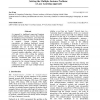Free Online Productivity Tools
i2Speak
i2Symbol
i2OCR
iTex2Img
iWeb2Print
iWeb2Shot
i2Type
iPdf2Split
iPdf2Merge
i2Bopomofo
i2Arabic
i2Style
i2Image
i2PDF
iLatex2Rtf
Sci2ools
135
click to vote
ICML
2000
IEEE
2000
IEEE
Solving the Multiple-Instance Problem: A Lazy Learning Approach
As opposed to traditional supervised learning, multiple-instance learning concerns the problem of classifying a bag of instances, given bags that are labeled by a teacher as being overall positive or negative. Current research mainly concentrates on adapting traditional concept learning to solve this problem. In this paper we investigate the use of lazy learning and Hausdorff distance to approach the multipleinstance problem. We present two variants of the K-nearest neighbor algorithm, called BayesianKNN and Citation-KNN, solving the multipleinstance problem. Experiments on the Drug discovery benchmark data show that both algorithms are competitive with the best ones conceived in the concept learning framework. Further work includes exploring of a combination of lazy and eager multiple-instance problem classifiers.
Concept Learning Framework | ICML 2000 | Machine Learning | Multiple-instance Problem Classifiers | Traditional Supervised Learning |
Related Content
| Added | 17 Nov 2009 |
| Updated | 17 Nov 2009 |
| Type | Conference |
| Year | 2000 |
| Where | ICML |
| Authors | Jun Wang, Jean-Daniel Zucker |
Comments (0)

